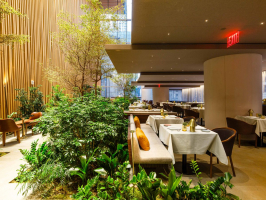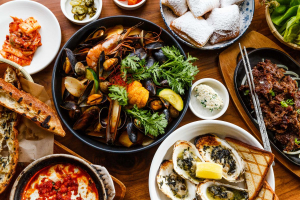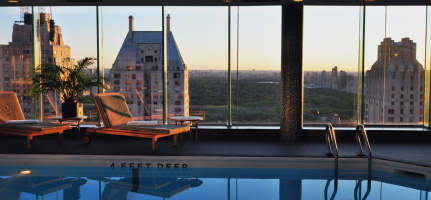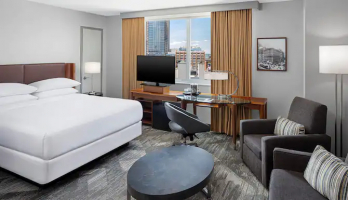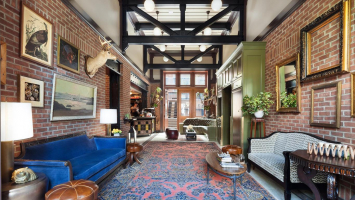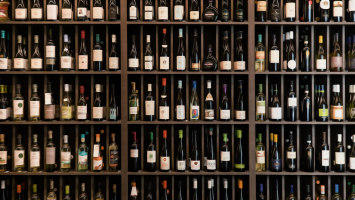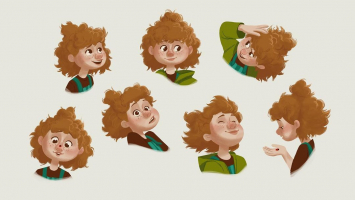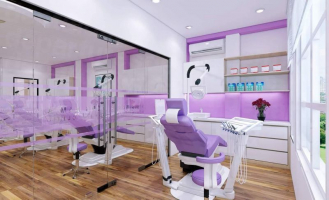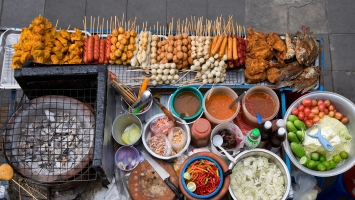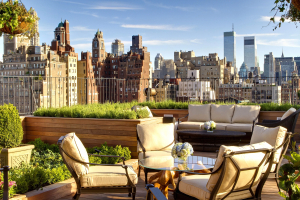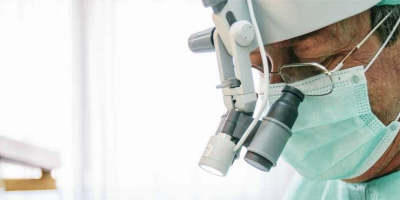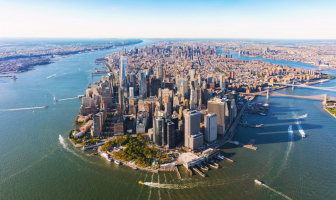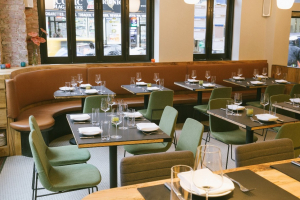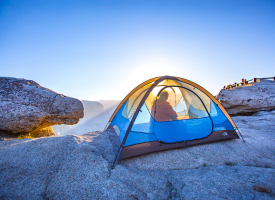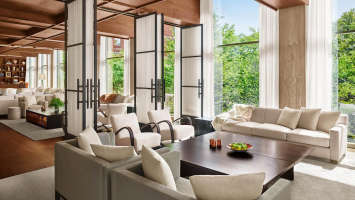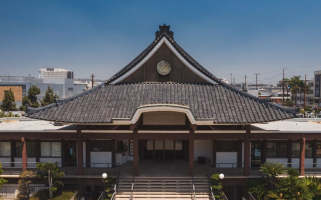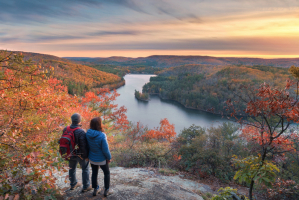Top 10 Best Buddhist Temples in New York City
There are many different cultures and spiritual practices in New York City. Among the city's many important places, there are peaceful and quiet Buddhist ... read more...temples. In this article, we have found out the ten best Buddhist temples in New York City. These temples are not just places to pray; they also play a role in the city's culture.
-
Karma Triyana Dharmachakra (KTD) is a peaceful place for Tibetan Buddhists in Woodstock, New York. It started in 1976 by the 16th Gyalwang Karmapa, Rangjung Rigpe Dorje. He's like the leader of the Karma Kagyu school of Tibetan Buddhism, a big group that likes meditation and passing down teachings from one person to another.
KTD is in the pretty Catskill Mountains, a great place for thinking and meditating. The central part of KTD is the Karmapa Khyenno Temple, a nice place where they do religious things. There are traditional Tibetan Buddhist statues, paintings, and essential books inside.
If you want to stay a long time and learn, KTD has places for monks, nuns, and regular people. They often have unique retreats, workshops, and programs where people can learn more about Buddhist ideas and practices. The 17th Karmapa, Thaye Dorje, the leader now, has a home at KTD. Sometimes, he comes to teach and do special ceremonies.
KTD also likes to reach out and teach others. They have classes, talks, and events to introduce people to Tibetan Buddhism and meditation. The area around the monastery has a particular Tibetan structure called a stupa, representing an enlightened mind. People often walk around it as a way of meditating.
KTD's library has many Buddhist books and things to help people learn. They also have study programs and classes to help people understand more about Buddhist ideas.Detailed information:
- Address: 335 Meads Mountain Rd, Woodstock, NY 12498, United States
- Phone: +1 845-679-5906
- Website: https://www.kagyu.org/

Screenshot of https://www.kagyu.org/ 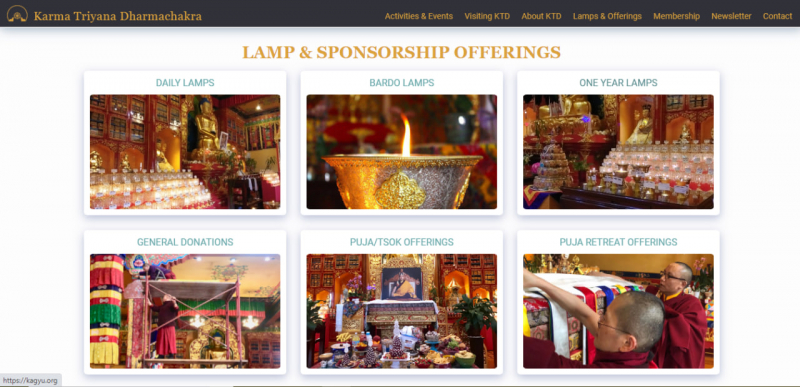
Screenshot of https://www.kagyu.org/ -
Blue Cliff Monastery is a Buddhist temple in New York where people can learn about mindfulness. It was started by Thich Nhat Hanh, a well-known Vietnamese Zen Buddhist monk, teacher, and peace activist. Thich Nhat Hanh created Blue Cliff Monastery as part of the Plum Village Tradition, a worldwide community focusing on mindfulness and kindness.
The monastery is in the Hudson Valley and covers more than 80 acres of woods. It provides a peaceful setting for practicing mindfulness. It's about 90 miles north of New York City, offering a getaway from the busy city life.
At Blue Cliff Monastery, the main focus is on teaching mindfulness. This includes different activities like meditation, walking meditation, mindful eating, and other calming exercises. The monastery welcomes people who want to stay for a while (residential participants) or prefer just daytime visits (non-residential participants). The programs and retreats cover various aspects of mindfulness, such as reducing stress, learning meditation methods, and bringing kindness into everyday life.
The monastery regularly hosts mindfulness retreats and special events for people to deepen their practice. During these retreats, participants might be silent, listen to teachings (Dharma talks) from experienced teachers, and join group activities to build a sense of community.
Blue Cliff Monastery is committed to creating a supportive community, not just during events but all the time. The beautiful natural surroundings of the monastery enhance the experience, allowing people to connect with nature and deepen their mindfulness practice.Detailed information:
- Address: 3 Mindfulness Rd, Pine Bush, NY 12566, United States
- Phone: +1 845-213-1785
- Website: https://www.bluecliffmonastery.org/

Screenshot of https://www.bluecliffmonastery.org/ Video by Luke DeVita -
Vajiradhammapadip Temple, located in the West Bronx, New York City, was officially set up as a Not-for-Profit Organization under the State of New York Religious Corporation Law on July 22, 1975 (B.E. 2518). Today, it proudly claims to be the first fully recognized Thai Buddhist temple in the United States, with legal and religious standing.
The Vajiradhammapadip Temple complex comprises two buildings on a 4.98-acre lot, formerly a church. The main building has a large hall that can hold up to 500 attendees, with separate restroom facilities for men and women. The property also includes a four-bedroom house used for occasional guests and a parking lot that accommodates 150 cars. The temple's location, not too close to other residences, adds to its appeal. Buddhist communities in the Tri-State area during all significant holy days and festive occasions.
The temple is known for hosting merit-cultivating ceremonies and festivals. Notably, it has seen many gatherings of friends and relatives participating in merit-making ceremonies, either within the temple or at the homes of generous alms-givers. These ceremonies mark essential occasions like birthdays, weddings, house blessings, and sad events like funerals and memorials. The observance of Buddhist holy days and cultural celebrations like New Year's Day and Songkran (a Thai cultural festival) are also integral to the temple's calendar, drawing large crowds that the relatively modest temple building can barely accommodate.Over the years, Vajiradhammapadip Temple has become a central hub for Thai religious and cultural activities in New York and is a crucial point for such activities throughout the United States. It attracts diverse visitors, including Thais, Americans, and people from various nationalities living in the Tri-State area, other states, and even from Thailand.
Detailed information:
- Address: 110 Rustic Rd, Centereach, NY 11720, United States
- Phone: +1 631-471-8006
- Website: https://www.vajira.org/

Screenshot of https://www.vajira.org/ 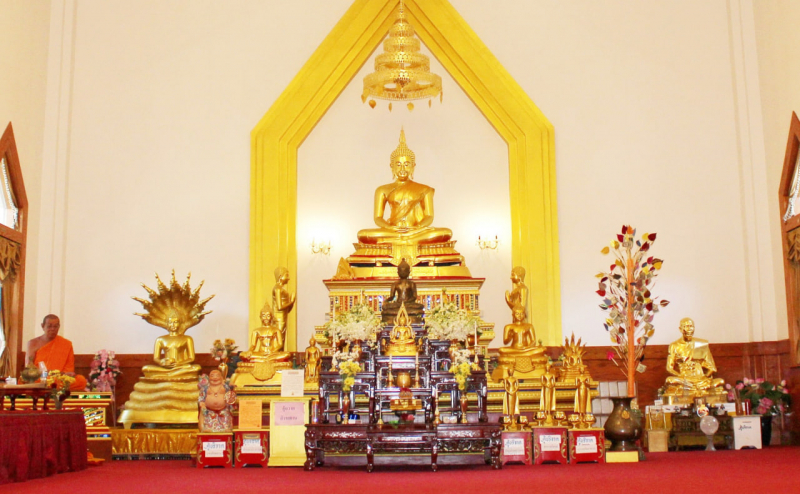
Screenshot of https://www.facebook.com/photo/?fbid=627277462763864&set=a.627277449430532 -
The New York Buddhist Church is a significant Buddhist place in New York City. It's at 331-332 Riverside Dr, New York, NY 10025. This temple follows the Jodo Shinshu school of Buddhism, also known as Shin Buddhism. "May the Wisdom and Compassion of Amida Buddha, which embraces us just as we are, touch your heart so that you may be awakened to the world of Living With Nembutsu," guided by the teachings of Shinran Shonin (1173-1262). It was created to be a place for people in New York City who follow these teachings.
The New York Buddhist Church aims to share Buddhism's teachings and promote Buddhist education, cultural activities, and community well-being. The temple does various things, like having regular chanting services and talking about Buddhist teachings. They also offer classes for adults and kids about Buddhism and meditation.
The temple is big on cultural events, celebrating traditional Japanese and Buddhist festivals. They're also very active in helping the community through service and working with other groups for peace and social welfare. Regardless of background, anyone can join the New York Buddhist Church.
Your donations are much appreciated at any time. However, being a committed member is especially helpful because it provides ongoing support for the temple. This support helps cover the costs of running the temple and achieving its goals. While everyone is welcome to attend our services, you need to be a member to take part in special events like the Kieshiki (Buddhist name-giving confirmation ceremony), receive scholarship awards, and vote in annual meetings. Also, the amount of your membership fees supports our national organization, the Buddhist Churches of America (BCA).Detailed information:
- Address: 332 Riverside Dr, New York, NY 10025, United States
- Phone: +1 212-678-0305
- Website: https://www.newyorkbuddhistchurch.org/
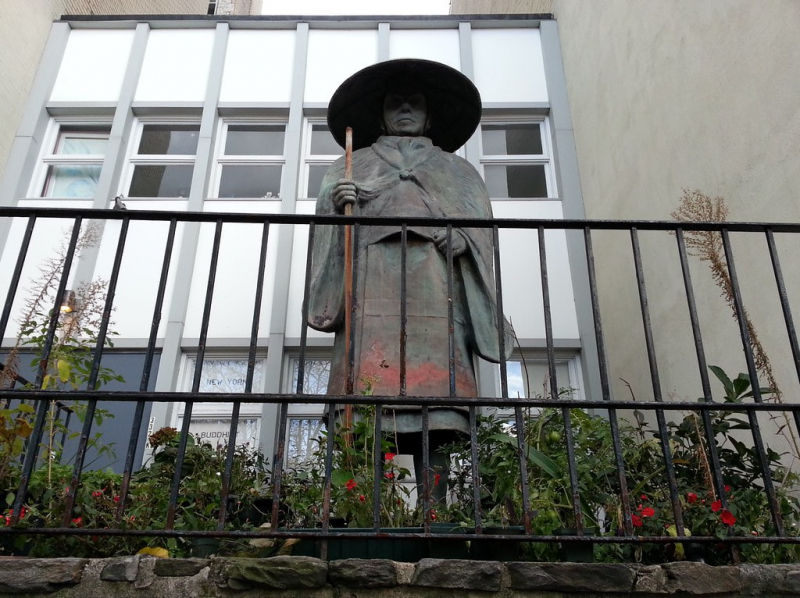
Photo of https://www.flickr.com/photos/imjustwalkin/11359352274 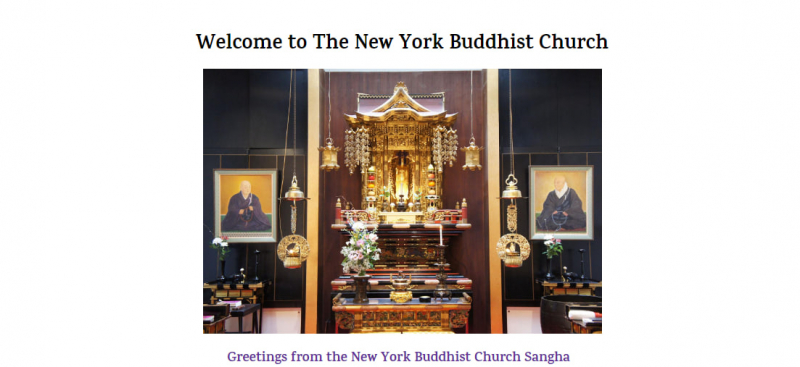
Screenshot of https://www.newyorkbuddhistchurch.org/ -
Chuang Yen Monastery, founded in 1975 by Venerable Tien Ju, is a prominent Buddhist monastery in Carmel, New York, approximately 60 miles north of New York City. The sanctuary is affiliated with the Chán (Zen) tradition of Buddhism and follows the teachings of the Linji school. Nestled in a serene and picturesque setting, Chuang Yen Monastery is known for its tranquil surroundings that attract visitors seeking spiritual solace.
One of the standout features of the monastery is the Great Buddha Hall, which houses a colossal indoor statue of the Buddha Vairocana. This impressive statue, often called the "Great Buddha of Wisdom," stands over 37 feet tall, making it one of the largest Buddha statues in the Western Hemisphere. The monastery's architecture and serene landscape contribute to a contemplative atmosphere that enhances the spiritual experience for both practitioners and visitors.
Chuang Yen Monastery provides various facilities, including a library and meditation halls, where individuals can practice meditation and study Buddhist teachings. The monastery is open to the public, and visitors are encouraged to explore the grounds, participate in guided tours, and attend events that include meditation retreats, Dharma talks, and cultural celebrations.
In addition to its religious activities, Chuang Yen Monastery is actively involved in cultural and educational programs to promote understanding and appreciation of Buddhist philosophy and Chinese culture. The monastery is a welcoming space for local visitors and pilgrims worldwide, offering a haven for those seeking spiritual guidance and a place for reflection.Detailed information:
- Address: 2020 NY-301, Carmel Hamlet, NY 10512, United States
- Phone: +1 845-225-1819
- Website: https://www.baus.org/en/
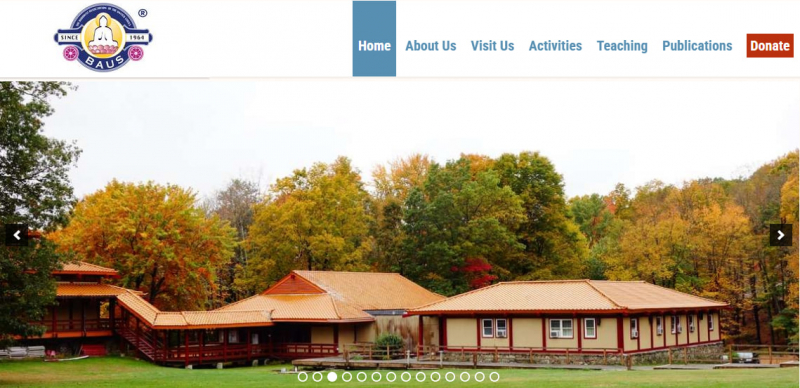
Screenshot of https://www.baus.org/en/ 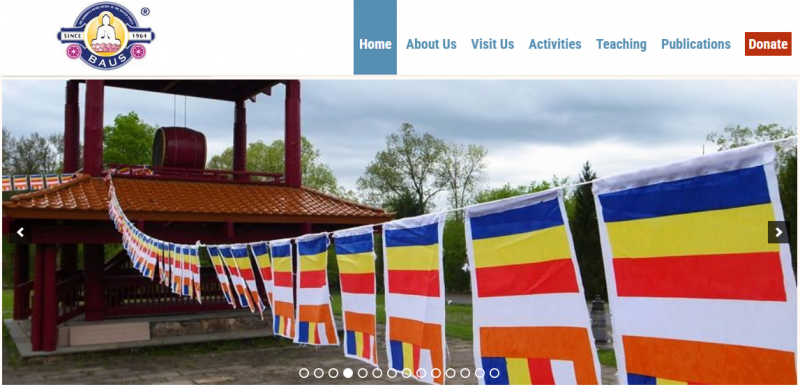
Screenshot of https://www.baus.org/en/ -
Buddhism first came to the Eastern United States through New York. Mrs. Annie Jin Ying was the first to bring Chinese Mahayana Buddhism to New York City. She founded the Eastern States Buddhist Temple of America, Mahayana Temple. It is the oldest Chinese Buddhist temple on the eastern coast of the United States.
After spending many years building the first Chinese Buddhist retreat in New York, Mrs. Ying realized that the existing Buddhist temples in the city were still mostly small storefronts. They couldn't host significant events for their community. So, Mrs. Annie Ying decided to build a Mahayana (City) Temple in the center of New York's Chinatown. It was dedicated on March 3rd, 1997, to honor Mr. James Ying's 83rd birthday.
Mahayana Temple is open to everyone seeking a better life on earth and in the afterlife. They offer tours for schools and private groups of 10 or more throughout the year, any day of the week from 10:00 AM to 4:00 PM. The times aim to promote cross-cultural understanding and provide a chance to learn about Buddhism 101 and the temple's history.
To visit Mahayana Temple, you must make reservations at least 14 days in advance. You can also sponsor rituals and prayers for critical personal occasions. Practices for the living aim to improve health, prolong life, help achieve goals, offer strength and support, remove obstacles, and prevent harm. Rituals for the deceased aim to purify past mistakes, ensure a better next life, and reduce fear during the intermediate state.
Mahayana Temple also offers in-person Chinese calligraphy classes. You'll use traditional calligraphy brushes in these classes to write simple characters. The goal is to explore how this artistic practice affects your body, mind, and spirit.
The Mindfulness and Introspection Meditation class, designed by Venerable Pannasiri, is for those of us caught up in the busy life of the Big Apple. It guides participants to focus on their true nature, clear worries, and connect with their inner wisdom.Detailed information:
- Address: 710 Ira Vail Rd, Leeds, NY 12451, United States
- Phone: +1 518-622-3619
- Website: https://en.mahayana.us/
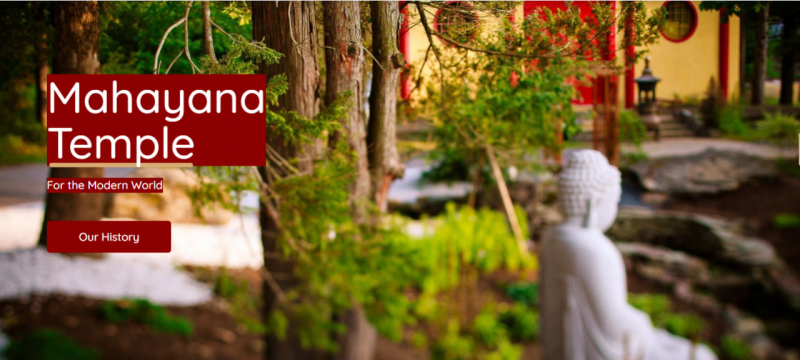
Screenshot of https://en.mahayana.us/ Video by MNN NYC -
Hanmaum Zen Center of New York, established in 1989, is in the heart of Flushing, Queens. It is one of the best Buddhist temples in New York City. This spiritual sanctuary is affiliated with a branch of the Jogye Order of Korean Buddhism, the most significant Buddhist order in South Korea, with roots tracing back to the 11th century.
The visionary behind the center is an ordained nun, Daehaeng Kun Sunim, who founded the Hanmaum Seon Center (HSC). This global organization extends its reach to various corners of the world, with centers in Brazil, Canada, Germany, Thailand, and Argentina. In the United States alone, there are four branches, including the one nestled in the vibrant city of New York.
The architectural marvel of the temple captivates observers with its vibrant and intricately carved wooden eaves. It is along with exposed beams that add a touch of elegance. The Hanmaum Zen Center of New York stands out conspicuously in its surroundings, strikingly contrasting the neighboring suburban houses. Despite the modern landscape, the temple possesses an air of serenity and almost seems concealed, inviting visitors to explore its unique and tranquil atmosphere.Detailed information:
- Address: 144-39 32nd Ave, Flushing, NY 11354, United States
- Phone: +1 718-460-2019
- Facebook: https://www.facebook.com/nyhanmaumpage
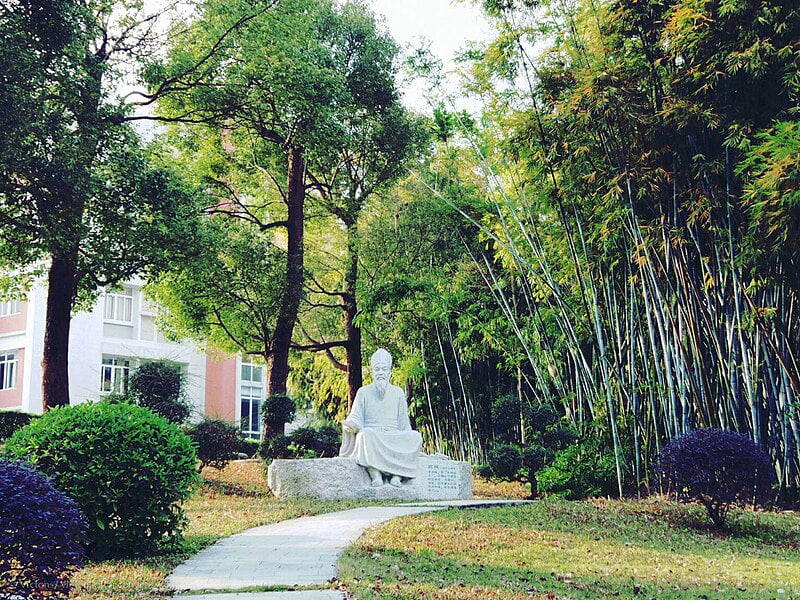
Photo of https://commons.wikimedia.org/wiki/File:%E5%B9%BF%E5%B7%9E%E4%BA%8C%E4%B8%AD%E7%A7%91%E5%AD%A6%E5%9F%8E%E6%A0%A1%E5%8C%BA%E4%B8%9C%E5%9D%A1%E5%83%8F.jpg 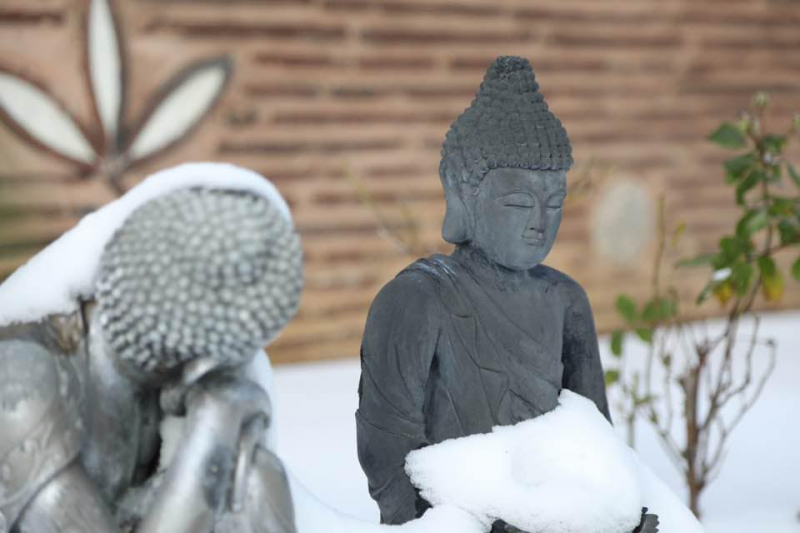
Screenshot of https://www.facebook.com/photo/?fbid=3699561890120301&set=pb.100064909471098.-2207520000 -
The Rochester Zen Center is in the Park Avenue neighborhood of Rochester, New York, and it's a significant place for Zen Buddhism in the United States. It was started in 1966 by Roshi Philip Kapleau, who learned from Zen masters in Japan. The center has played a vital role in introducing and supporting the practice of Zen Buddhism in the Western world. They combine teachings from both Rinzai and Soto Zen traditions.
The center's physical space includes a meditation hall, living rooms, and community gathering areas. It's a lively place for people interested in Zen. The center focuses on Zen meditation, zazen, and mindfulness practices. They have regular meditation sessions that welcome both experienced practitioners and beginners. The center is open to anyone curious about Zen and offers introductory workshops and programs.
The Rochester Zen Center organizes residential retreats and workshops. These events provide a profound experience for participants to enhance their meditation practice and incorporate mindfulness into their lives. The withdrawals usually include silent meditation, teachings about Zen principles (Dharma talks), and group activities that create a sense of shared practice.
The Rochester Zen Center actively reaches out to the community and runs educational programs. They aim to bring Zen principles into everyday life and share the benefits of mindfulness beyond formal meditation. Following the tradition of passing down teachings from teacher to student, successive leaders have taken over after Roshi Philip Kapleau.
Dharma talks, discussions, and study groups are essential to the center's offerings. These sessions explore Buddhist teachings, discussing how they relate to and can be applied daily. The center also highlights integrating Zen principles into art and culture, organizing events that showcase Zen-inspired skills and performances.Detailed information:
- Address: 7 Arnold Park, Rochester, NY 14607, United States
- Phone: +1 585-473-9180
- Website: https://www.rzc.org/

Screenshot of https://www.rzc.org/ 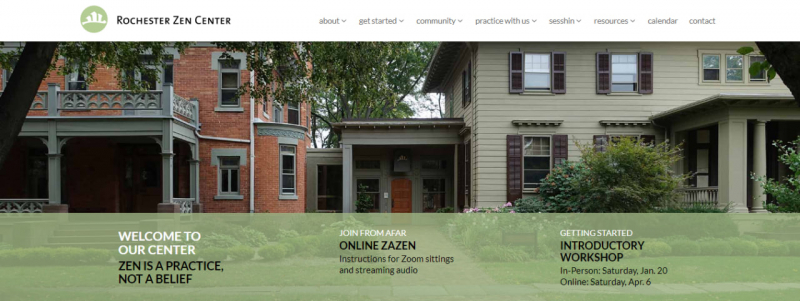
Screenshot of https://www.rzc.org/ -
Zen Mountain Monastery is a unique Buddhist temple in Mount Tremper, New York, where people practice Zen Buddhism. It was started in 1980 by a teacher named John Daido Loori Roshi, who learned from Taizan Maezumi Roshi, an important person who brought Zen Buddhism to the West.
The monastery is in the pretty Catskill Mountains, and it's all about practicing zazen, which is sitting meditation. They have a program for people who live or visit to learn and practice meditation, work around the place, and hear teachings about Zen.
The main building has a room called the zendo, where they meditate and talk about Zen. They also have places for people to stay if they want to practice longer. Throughout the year, the monastery organizes different programs and events for people to join and learn more about meditation and Zen.
Zen Mountain Monastery cares about sharing Zen with others. They offer workshops, classes, and events for the wider community. The monastery is also into Dharma art, connecting artistic expression with spiritual practice. They often have cultural events like art shows, performances, and workshops.
After the person who started the monastery, John Daido Loori Roshi passed away in 2009, other leaders have continued guiding Zen Mountain Monastery. They believe in passing down teachings from one teacher to the next to keep the tradition going.Detailed information:
- Address: 871 Plank Rd, Mt Tremper, NY 12457, United States
- Phone: +1 845-688-2228
- Website: https://zmm.org/
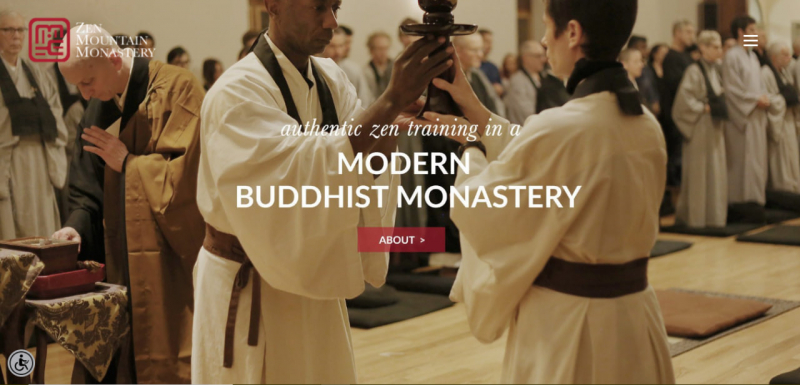
Screenshot of https://zmm.org/ 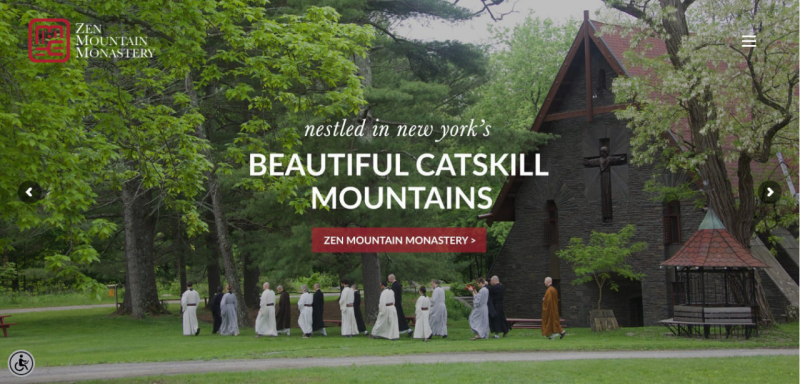
Screenshot of https://zmm.org/ -
Zen Buddhist Temple is a group of people who practice Buddhism and meditation. They follow the Korean Zen tradition and offer meditation services, classes, retreats, and teachings about Buddhism. Their community is in five cities in North America: Toronto, Ann Arbor, Chicago, New York City, and Mexico City. These centers help with meditation, train people in Buddhism, and encourage a culture of enlightenment and green spirituality.
The New York City branch of Zen Buddhist Temple opened in 2014 after renovating a building on 206 E. 63rd Street in Manhattan for three years. The idea of starting a temple in New York City began in November 2007 when they rented an apartment in Chinatown. After moving around a bit, they bought the current temple building in March 2011. The person who started this, Venerable Samu Sunim, worked hard to find and oversee the renovation. Their teachers, Gagan Rocco Caputo and Soyong Timothy Niewold lead the Sunday services and teach meditation.
It's been forty years since Samu Sunim came to North America. He started temple communities in Toronto, Ann Arbor, Chicago, and Mexico City during this time. He also published a non-sectarian Buddhist journal and organized conferences in Ann Arbor, Michigan, and Toronto, Canada. They celebrate his achievements and look forward to more exciting years ahead!
Zen Buddhist Temple also has programs to train Buddhist teachers and urban professionals. They organize events like yearly ceremonies, seminars, and conferences to promote art, culture, and understanding of social issues. Their quarterly journal, Spring Wind: Buddhist Cultural Forum, informs their members about activities and discusses how Buddhist values apply to modern life.Detailed information:
- Address: 206 E 63rd St, New York, NY 10065, United States
- Phone: +1 212-888-6262
- Website: https://www.zenbuddhisttemple.org/nyc
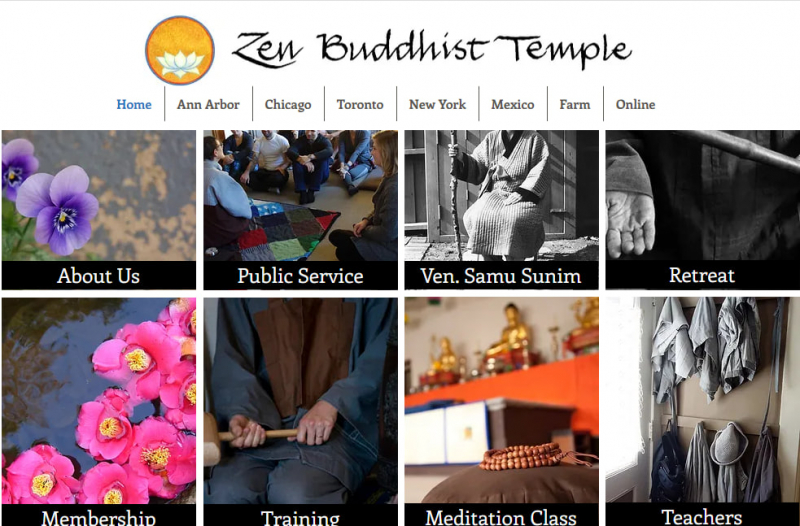
Screenshot of https://www.zenbuddhisttemple.org/nyc 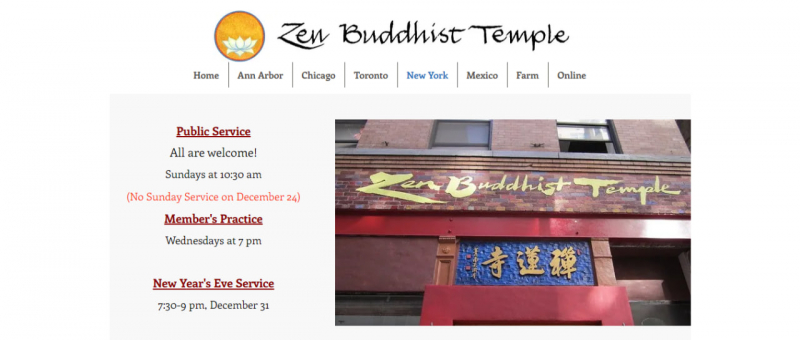
Screenshot of https://www.zenbuddhisttemple.org/nyc












